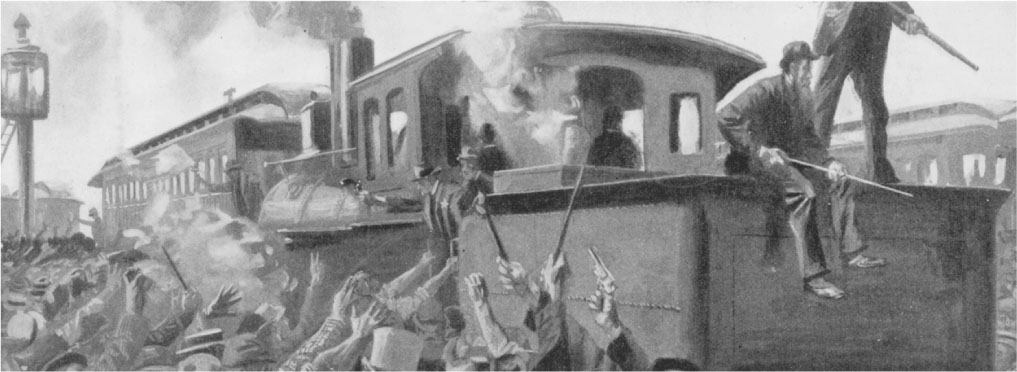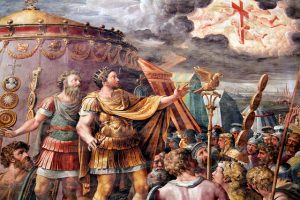
George Mortimer Pullman was an engineer and ambitious entrepreneur. He found success as a building contractor. In 1867, Pullman created a new line of luxury railroad cars featuring comfortable seating, restaurants, and improved sleeping areas known as Pullman coaches. Following his success in 1867, he built a town on a four thousand acre piece of land. There, twenty-seven years after his initial success, one of the most dramatic events in United States labor history took place: the Pullman Strike.
In 1880, near Lake Calumet on the southwest edge of Chicago, the village of Pullman was built. His town contained a hotel, a school, a library, a church, and office buildings, as well as parks and recreational facilities. Pullman also built houses with indoor plumbing and gas heating. He managed his town as he did his other businesses; he leased the housing to his workers.
Many factors contributed to the economic downturn of 1893. The nation’s gold reserves dropped drastically, federal spending depleted U.S. Treasury surpluses, and finally the passage in 1890 of the Sherman Silver Act culminated in the financial panic of 1893. 1 All of these events unleashed a domino effect on the American economy. Corporations failed, resulting in mass layoffs. Many banks also closed, unable to keep afloat during this chaotic time. Combined, all of these closures and general uncertainly plunged the country into a major economic depression. Pullman’s response to the crisis was to fire more than a third of his workforce; he instituted reduced hours and cut the wages for the remaining hourly employees by more than twenty-five percent. Because Pullman had promised the town’s investors a six percent return, there was no corresponding reduction in the rents and other charges paid by the workers. Rent was deducted directly from their paychecks, leaving many workers with no money to feed and clothe their families.2
In desperation, many of Pullman’s workers joined the American Railway Union (ARU). Eugene V. Debs was the organizer of the ARU and well known for a strike against the Great Northern Railway company. In May of 1894, Pullman workers went on strike. Workers agreed to permit trains carrying the U.S mail to operate as long as they did not contain Pullman cars. Railroads refused to participate. Despite Debs’ opposition, an ARU convention voted to stop handling Pullman cars after the company ignored efforts to settle the dispute. The union, by detaching Pullman cars from the trains, sought to deplete the revenues of the Pullman Palace Car Company (PPCC) and force negotiations.3 George Pullman refused to negotiate. As the strike proceeded, rail lines were shut down and the railroads formed the General Managers Association (GMA), an organization of twenty-four railroad companies operating in or through Chicago. The railroads were determined to honor their contracts with the PPCC, insisting that trains run with Pullman cars attached. Alarmed at the rapid growth of the ARU, they were eager for a chance to crush it.4

The ARU responded with a union walkout, and fifty thousand railroad workers walked off from their jobs. When striking workers refused to spread out and end the strike, U.S. attorney general Richard Olney, who supported the GMA, obtained an order holding the workers in contempt, declaring the strike illegal. Richard Olney requested federal troops, saying they were needed to move the mail, and President Grover Cleveland sent more than two thousand troops to Chicago. Rioting and fighting broke out between the troops and the strikers. Many strikers were killed and wounded by the troops. Debs was arrested and charged for disobeying the court order and for conspiracy to obstruct the U.S. mail. Debs spent six months in prison. Many workers returning to their jobs found out that they had been permanently replaced and blacklisted from future railroad work.
The failure of the strike was a major defeat for labor unions in the United States. The ARU fought for what they believed was right as labor workers, but with the unfortunate disagreement, and the undesirable fight against business management, and no agreement between both ARU and GMA, the strike came to an end by the federal government.5 Clearly, the Pullman Strike of 1894 was not only a defeat for American labor, but it had a significant impact on the life and welfare of American workers for decades. One legacy of this event, however, was the federal government’s decision to declare a national holiday, known as Labor Day, six days after the end of the strike.
- Columbia Electronic Encyclopedia, 6th Edition, April 2016, s.v. “Sherman Silver Purchase Act.” ↵
- Salem Press Encyclopedia, January 2015, s.v. “Pullman Strike,” by Merl E Reed and Irwin Halfond. ↵
- Salem Press Encyclopedia, January 2015, s.v. “Pullman Strike,” by Merl E Reed and Irwin Halfond. ↵
- Salem Press Encyclopedia, January 2015, s.v. “Pullman Strike,” by Merl E Reed and Irwin Halfond. ↵
- Salem Press Encyclopedia, January 2015, s.v. “Pullman Strike,” by Merl E Reed and Irwin Halfond. ↵




42 comments
Jezel Luna
All this time we have been celebrating Labor Day and little did we know it originated from the Pullman Strike! I admired them for being able to stand up for themselves by risking their job. It was sad to hear that it resulted in many of the strikers being killed. I’m glad the ARU never gave up no matter what! I guarantee that their passion, motivated other workers in labor unions to stand up for themselves in future battles!
Jorge Manzanares
Amazing article! I love how you included all the main actors in the strike. Pullman was under heavy stress due to the economic crisis and his investors. However, at the same time, the workers were under even more stress due to the lack of reduction on their bills. Their wages were lower, but the bills remained the same. Well done on illustrating the whole issue!
Yesenia Cardenas
Incredible, I had no idea that the Pullman Strike was the reason for Labor Day. I assumed that it was just another day off of school and work. It angers me to read about how terrible of a boss Pullman was. I believe that this strike lead to labor unions strengthening in power today. Outstanding job!
Phil
Laborday, wow who knew… Not just another day off.
Rachel White
Wow, I didn’t know he had a town built solely for his workers! I also didn’t know he was such a jerk boss that didn’t care about his employees by nearly starving them to death by not cutting their rent costs. If this man had enough money to build a town, you would think he could spare some and help out the community. Although the strike was a failure, in the long run, it did help to strengthen the labor unions that are apparent today. Good job writing this and very interesting topic.
Soki Salazar
This article was great! I did not expect the ending at all; finding out that the Pullman Strike is the reason for our extra day off (Labor Day) made me appreciate this even more. It was upsetting to see that he had no remorse for his workers who labored so hard to build his company to the peak at which it was. It was quite disheartening to find out that after all of the effort that these men put in to receive a lower rent or more pay ended up without a job at the time and in that industry in general.
Aylin Salinas
This was a very interesting article! When I think of Labor day I do not think of all of the union workers that were not receiving any pay but more so a day off from school or work. It is quite tragic how the men were just advocating for more pay or at least a lower rent and were left without a job in the end. This has happened on several occasions such as the Delano grape strike lead by Cesar Chavez (a Mexican activist).
Patricia Solano
Great Job Aurora! I was not aware that the Pullman strike was the reason for Labor Day. One of my grandson’s asked my son this past Labor Day. Everyone had a different story. Now I can share this with my son and his boys. Well done!
Celina Resendez
Aurora, this article was amazing!! Great work!! I had no idea that the Pullman Strike was such a big ordeal. It is very unfortunate that even after banding together, the workers were not able to come out as the victors. It seems that “Big Money” was only looking out for himself and just left his workers to fend for themselves. We still see that today in some areas, and it is very unfortunate.
Analina Devora
Very informative article! I learned something new. It’s a shame that people in high power and wealth almost always seem to be unfair to their followers.
Aurora Torres
Agreed! Writing this article even I learned about this event that I didn’t even know happened. I had a great time researching on this event. Thank you so much for your feedback.